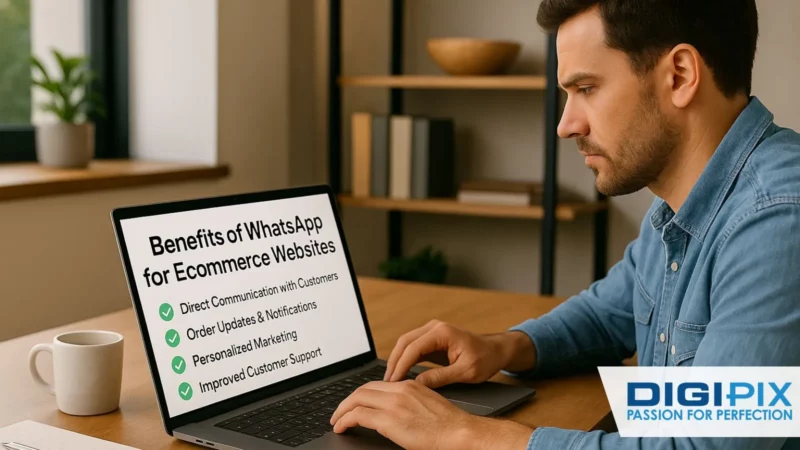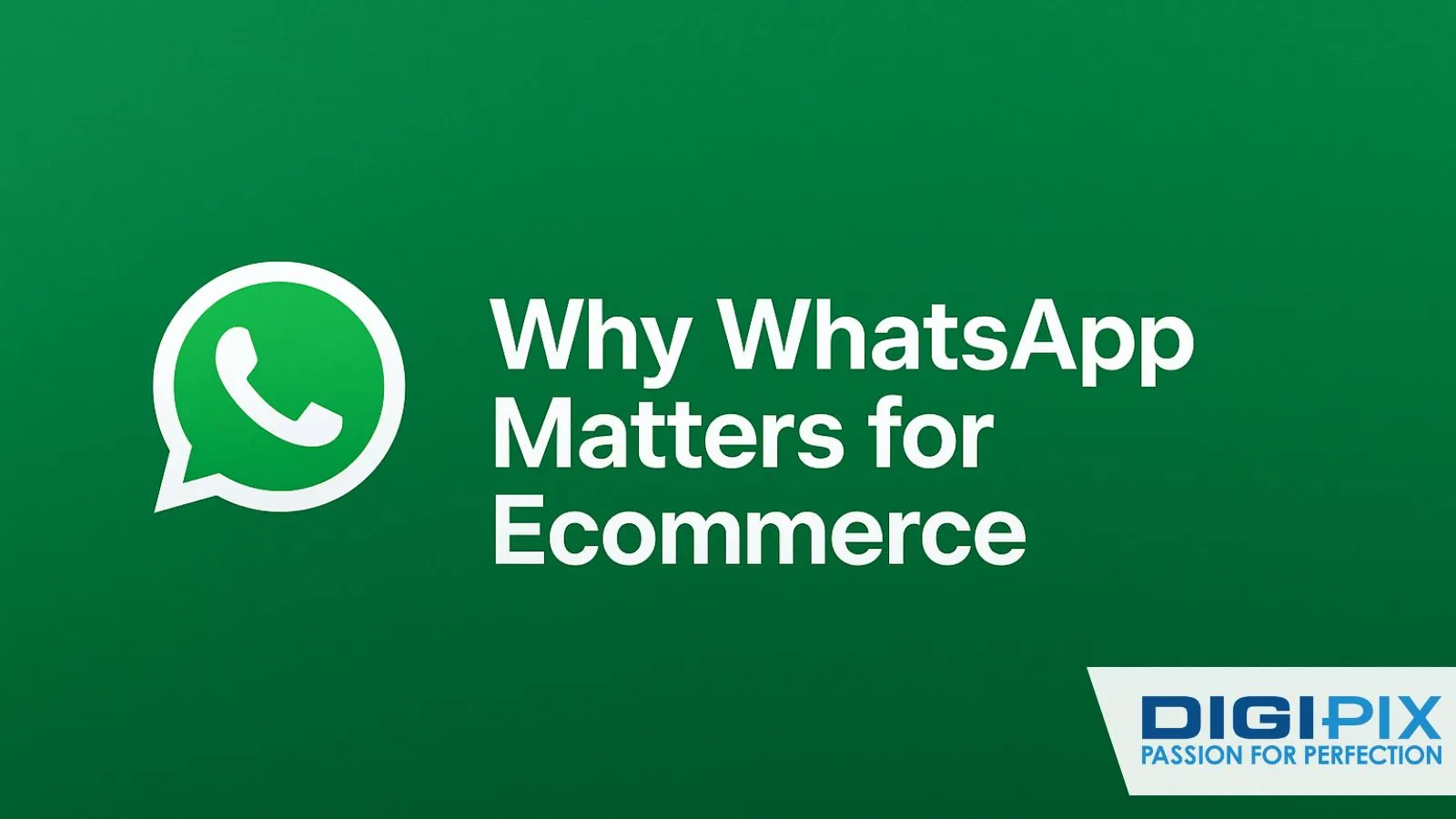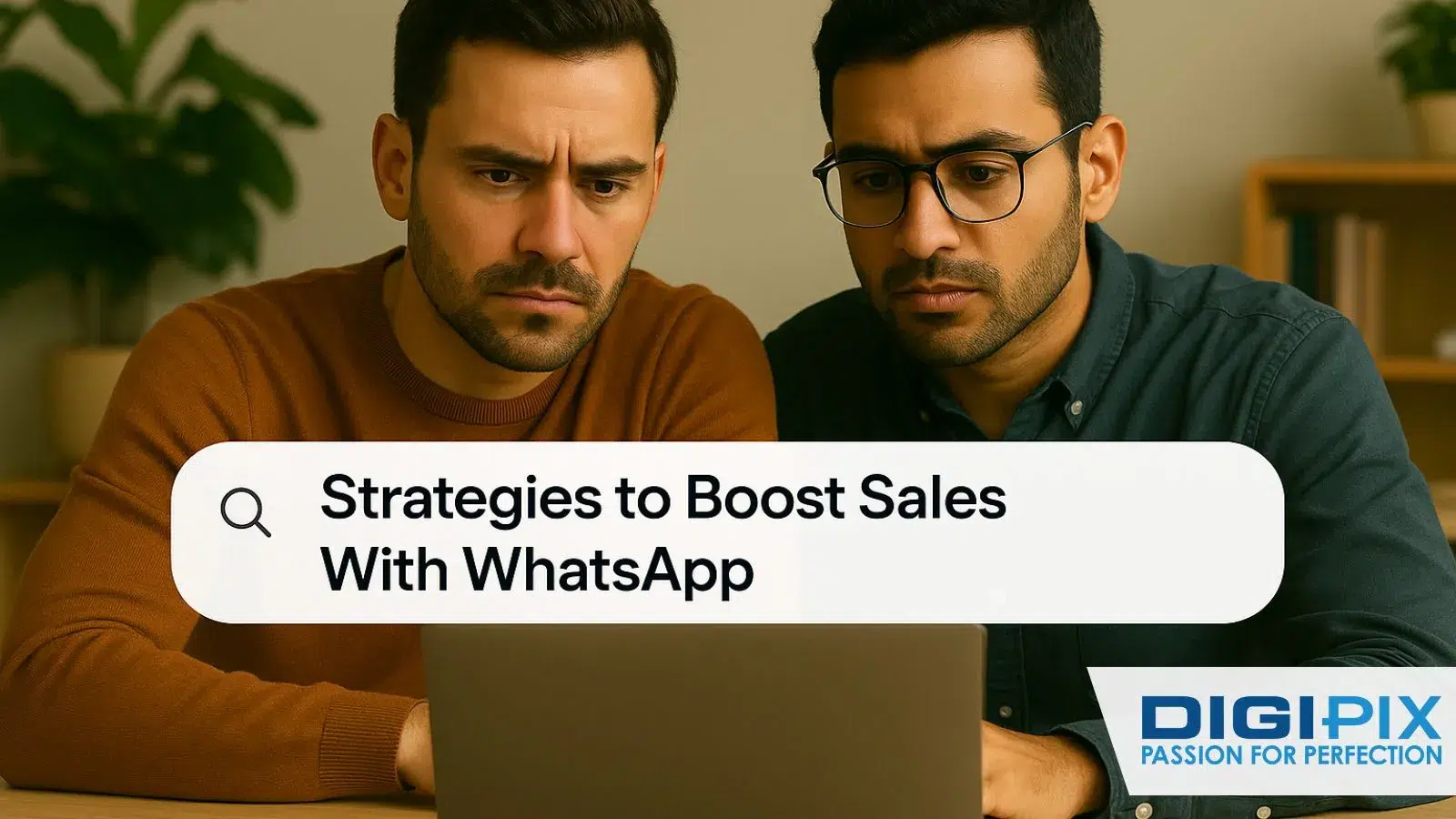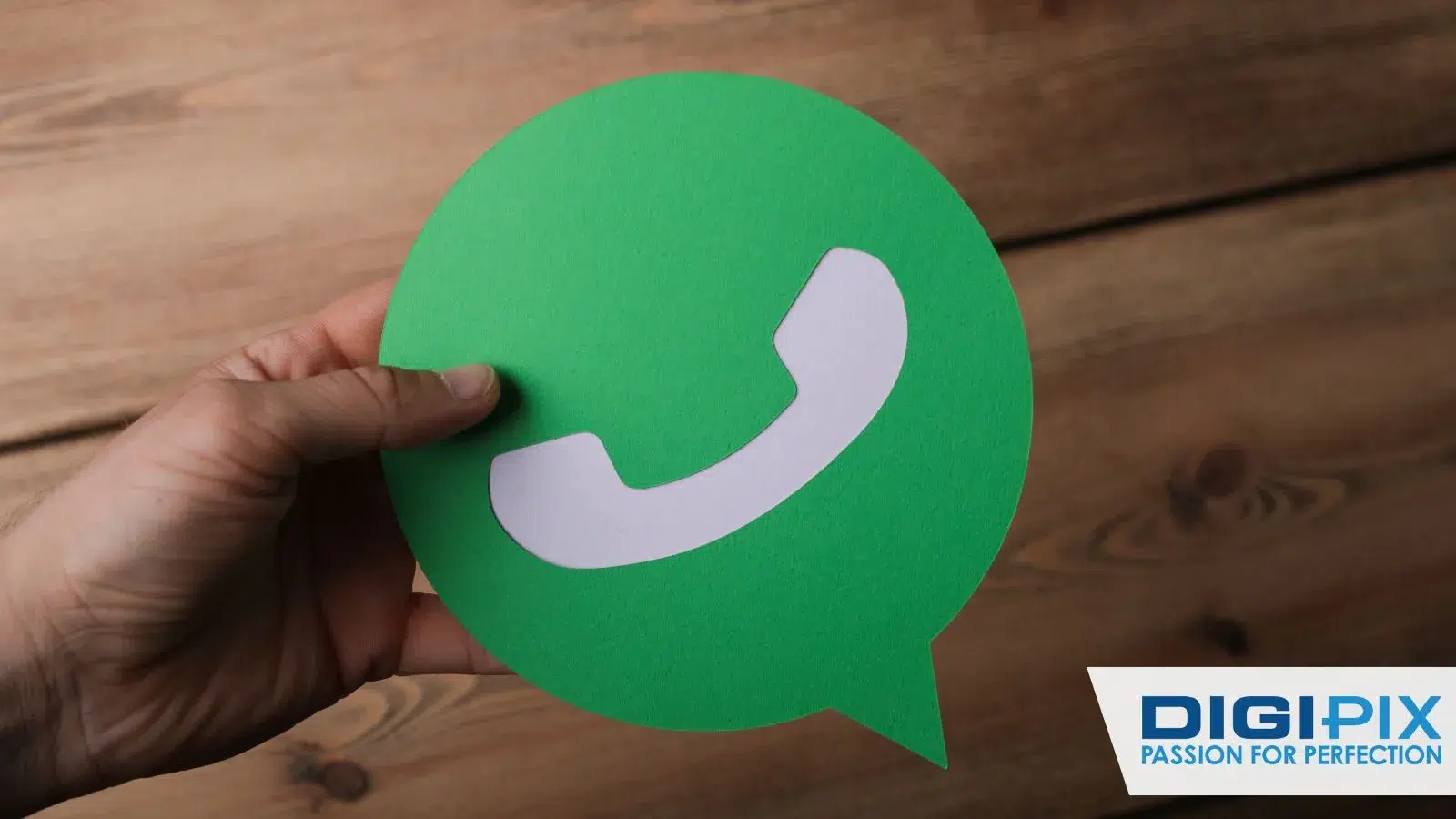WhatsApp for Ecommerce Websites; The Complete Guide

Shopping online has become a fast, sometimes impatient experience. People don’t want to wait for answers, they want them now. They want to know shipping times, product details, or whether something suits them, all without jumping through hoops.
If you can’t provide that, they’ll click away. That’s why WhatsApp has become a game-changer for eCommerce. With over 2 billion people using it every day, it’s more than just a chat app; it’s where customers already spend their time.
When a business shows up there, it’s like saying, “Hey, we’re here, ready to help.” And that instant connection can boost sales, build trust, & keep people coming back.
At DigiPix Inc., we’ve helped lots of online stores bring WhatsApp into their shopping experience. We’ve seen small changes make a big difference: quicker answers, happier customers & more completed orders.
In this guide, we’ll walk through why WhatsApp matters, how to use it on your website, & some practical tips to make it work for your store.

WhatsApp Importance for E-commerce
Why WhatsApp Matters for Ecommerce
When people browse your online store, they don’t always know exactly what they want. Sometimes they have a quick question. “Will this dress fit like the photo?” or “How long does shipping take?”
If they don’t get an answer right away, they often leave and buy somewhere else. WhatsApp solves that problem. Instead of sending an email and waiting hours, or even days, they can just message you directly.
It’s fast, simple, & happens on a platform they already use every day. That kind of instant help makes people feel confident and more likely to complete a purchase.
At DigiPix Inc., we’ve seen this in action across all kinds of stores, fashion, electronics, home goods, you name it. When brands added WhatsApp to their sites, a few things happened:
- Shoppers actually bought more because they felt supported.
- Fewer carts were abandoned, since questions got answered immediately.
- Customers came back more often, because they knew someone was always available to help.
In short, WhatsApp isn’t just a chat button, it’s a way to connect with your customers in real time, turning hesitation into action and making your online store feel a little more human.
Benefits of Using WhatsApp on Your Ecommerce Website
When I first helped a small online store set up WhatsApp for their customers, the difference was almost immediate. Shoppers who used to hesitate for hours, or even days; before deciding, suddenly felt like they had someone right there with them.
One customer asked about a pair of shoes she wasn’t sure would fit, & within a few minutes of chatting, she not only bought the shoes but also ordered a matching outfit. Moments like that show why real-time support matters.
Beyond answering questions, having a WhatsApp contact makes a business feel trustworthy. I’ve noticed that new brands or smaller stores often struggle to convince people to buy online.
But when a shopper sees that they can just message someone and get a response right away, it gives them confidence to click “buy now.” Another thing I’ve seen work really well is personal recommendations.
Instead of sending generic promotions, stores can actually talk to shoppers one-on-one. If a customer asks about jackets for winter, you can suggest options that fit their style, size, or budget.
It’s much more effective than any email newsletter because it feels like someone is actually paying attention to them. And there’s no denying it; people pay attention on WhatsApp.
Offers and updates get noticed far more than in an inbox that’s already overflowing with emails. Plus, sending order confirmations and shipping updates through WhatsApp is such a simple way to make customers feel taken care of.
They don’t have to log in, track emails, or worry about when their package is coming. Everything comes to them, in a place they already use every day.
All in all, WhatsApp doesn’t just make your store faster or more efficient; it makes it feel human. And in online shopping, feeling human is what makes customers trust you, return, & tell their friends.
How WhatsApp Works for Ecommerce Websites
Adding WhatsApp to an online store is simpler than most people think, but it can make a huge difference. I’ve helped clients set this up many times & the results always speak for themselves. Here’s how it usually works in practice:
Add a WhatsApp Chat Button
The first step is putting a button on your website that shoppers can click to start a conversation instantly. I usually recommend placing it on product pages and the cart page, so people can reach out exactly when they have a question.
One boutique I worked with added the button, & customers started messaging about sizing and colors almost immediately. It made the online experience feel a lot more like shopping in a real store, where someone is available to help.
Automate Initial Responses
You don’t have to answer every message manually. WhatsApp Business allows you to set up quick replies or greetings. For example, if a customer reaches out outside of business hours, you can automatically send a friendly note: “Hi! Thanks for messaging us.
We’ll get back to you in a few minutes. Meanwhile, here are some answers to common questions.” This keeps the conversation moving and prevents shoppers from getting frustrated waiting.
Unlock the benefits of local SEO with DigiPix our proven strategies connect your business with nearby customers, increase foot traffic & drive qualified leads.
Improve your local search rankings, appear in Google Maps results & build credibility with campaigns designed to maximize your reach.
See measurable growth with enhanced visibility, more website visits from local customers & a strategy focused on dominating local searches.
Start Free Now
Enable WhatsApp Business API for Scaling
For larger stores that get a ton of messages, the WhatsApp Business API makes handling everything so much easier. It’s a real lifesaver when your inbox starts overflowing.
It allows you to integrate WhatsApp with your CRM, automate certain notifications, & even send reminders about abandoned carts.
I’ve seen larger clients handle hundreds of messages daily without losing the personal touch, because the API makes it manageable while still letting humans jump in when needed.
Integrate With Your CRM or Ecommerce Platform
If your store is on Shopify, WooCommerce, or Magento, connecting WhatsApp to your system is surprisingly simple. One of my clients set it up this way & it completely changed how they interact with customers.
They could recommend products right in the chat based on what the customer had bought before; something that would have been nearly impossible to do through email alone.
One of my clients set it up this way and was able to suggest products based on past purchases right in the conversation, something that would have been nearly impossible with email alone.

Strategies to Boost Sales With WhatsApp
Strategies to Boost Sales With WhatsApp
Offer help when customers hesitate
Sometimes people spend a while looking at a product but don’t take action because they’re unsure. I’ve seen customers decide within minutes just because someone reached out at the right time.
Send personalized promotions
Instead of generic discounts, reach out based on what customers are actually interested in. For example, sending early access offers to people who browsed handbags last month made them feel noticed, & many bought immediately.
Recover abandoned carts
People leave items behind for many reasons. A simple, warm message like, “Hi! You left these in your cart; grab them now and enjoy free shipping!” can bring them back. I’ve seen dozens of carts recovered this way in just a few days.
Encourage repeat purchases with friendly reminders
I once worked with a small shop that started sending simple, friendly messages about loyalty points and upcoming rewards. Customers loved it, & over time, more of them came back to shop again.
Over time, more customers came back to make purchases just because they felt noticed and valued.
Keep messages personal and timely
The trick is to treat each message like a real conversation. When a customer messages you or seems interested in a product, reply in a way that feels personal and helpful. I’ve noticed that when responses sound genuine, like someone is actually guiding them.
It builds trust and encourages shoppers to return. WhatsApp stops feeling like just another notification and starts feeling like a real connection between your store and your customers.
Choosing Between WhatsApp Business App and API for Your Online Store
If you run a smaller online shop, the WhatsApp Business app is usually enough to get started. I’ve helped several local boutiques and small online stores set it up, & it covers most of what they need.
You can create a business profile so shoppers know who they’re talking to, set up quick replies for common questions, & even organize chats with labels. Setting it up is really simple, doesn’t need any technical know-how, & you can start using it right away.
For busier stores that get a ton of visitors and messages every day, the WhatsApp Business API is the better option; it helps you stay on top of conversations without losing that personal touch.
The API lets multiple team members respond at the same time, integrates with your CRM so you can see a customer’s past orders and conversations & allows automated notifications like order updates or abandoned cart reminders.
I’ve seen bigger Ecommerce brands manage large volumes of messages without losing the personal touch because the API makes it scalable while keeping chats organized and responsive.
At DigiPix Inc., we usually recommend starting small stores with the app and guiding larger businesses toward the API. The choice really comes down to how many customers you serve, how much automation you need, & your budget.
When used the right way, both the app and the API make WhatsApp more than just a messaging tool. It becomes a way to genuinely connect with your customers, guide them through their shopping decisions, & even help increase your sales.
Unlock the benefits of local SEO with DigiPix our proven strategies connect your business with nearby customers, increase foot traffic & drive qualified leads.
Improve your local search rankings, appear in Google Maps results & build credibility with campaigns designed to maximize your reach.
See measurable growth with enhanced visibility, more website visits from local customers & a strategy focused on dominating local searches.
Start Free Now
The Role of WhatsApp Business App vs API
WhatsApp Business App for smaller stores
If you’re running a small shop by yourself or just starting out, the WhatsApp Business app is a great fit. It’s simple to set up, easy to use, & helps you connect with customers quickly, without feeling overwhelmed.
I’ve seen solo business owners manage everything smoothly and still make customers feel like someone’s really there to help.
WhatsApp Business API for bigger stores
Once you start getting lots of messages, the app isn’t enough. The API lets multiple team members chat at the same time, link to your store or CRM, & even automate some updates like order tracking or cart reminders.
One client of mine went from overwhelmed to organized almost overnight by switching to the API.
See what works
With the API, you also get insights, like how fast people respond, which messages lead to sales, & where improvements are needed. It’s like having a behind-the-scenes look at your customer conversations.
Pick what fits
Small stores usually start with the app and move to the API when they grow. Big stores often need the API from day one. The goal is always the same: make shopping feel human, personal, & easy.

Best Practices for Using WhatsApp in Ecommerce
Best Practices for Using WhatsApp in Ecommerce
Be respectful with messaging
Nobody likes spam. Only message customers who have opted in & don’t overwhelm them with too many updates. One client I worked with used to send daily promotions, & people started ignoring messages.
Once we reduced it to meaningful updates, engagement went up immediately.
Keep a friendly, professional tone
WhatsApp feels casual, but your business still needs to sound trustworthy. I always tell clients to be warm and approachable, imagine you’re talking to a customer in your store, not sending a marketing broadcast.
Use visuals whenever possible
Pictures, videos, & catalogs make decisions easier. If a customer asks about a product, sending a photo or short video of it in use often answers questions faster than words alone. I’ve seen this reduce back-and-forth messages and speed up purchases.
Respond quickly
Customers expect fast replies. Even if you can’t answer immediately, let them know when you will. One store I worked with added a note saying, “We’ll get back to you within 15 minutes,” & it completely changed how shoppers felt; they trusted the brand more and completed purchases faster.
Measure and improve
Track how long it takes to reply, which messages lead to sales, & what feedback customers give. Small tweaks based on real data make a huge difference over time.
I’ve had clients improve conversions just by noticing which type of WhatsApp messages worked best and doing more of that.
Real World Example of WhatsApp Driving eCommerce Success
Struggling boutique store
There was a small clothing boutique I worked with that had a lot of visitors on their site but very few actual sales. Shoppers were interested, but they kept leaving the site because they couldn’t get answers fast enough.
Questions as simple as, “Does this dress run true to size?” or “What material is this top made from?” were enough to stop shoppers from finishing their order.
Introducing a WhatsApp button
We added a chat button to each product page. Almost immediately, people started reaching out. One shopper asked about a jacket’s fit, got a reply within a few minutes, & ended up buying the jacket plus a matching scarf.
It was the personal touch that made the difference.
Quick responses built trust
The store made it a rule to reply to messages within five minutes. That tiny change transformed the shopping experience. Customers felt like someone was actually there, ready to help, & they started completing their purchases instead of leaving.
Cart abandonment dropped
With instant replies and friendly nudges, many people who would have left items behind went ahead and bought them. In just a couple of months, cart abandonment dropped by about a quarter.
Unlock the benefits of local SEO with DigiPix our proven strategies connect your business with nearby customers, increase foot traffic & drive qualified leads.
Improve your local search rankings, appear in Google Maps results & build credibility with campaigns designed to maximize your reach.
See measurable growth with enhanced visibility, more website visits from local customers & a strategy focused on dominating local searches.
Start Free Now
Overcoming Common Challenges
Too many messages at once
When a small boutique I know added WhatsApp, messages started pouring in. Customers had questions about everything; sizes, colors, shipping times. At first, it was chaotic.
The owner was replying nonstop and was getting completely drained. After switching to a clear opt-in system, the complaints disappeared, & engagement went up. People like brands that respect their privacy; it builds trust fast.
Making messages feel personal
Even small things matter. Using the customer’s name, mentioning what they bought, or adding a friendly note makes a huge difference. I’ve watched hesitant shoppers turn into loyal buyers just because they felt someone on the other end was genuinely paying attention.
Conclusion
Running an online store is about more than having good products or a nice-looking website. I’ve seen so many small businesses lose sales simply because shoppers couldn’t get answers quickly when they needed them.
WhatsApp solves that problem. It puts real, human conversation right where people are already shopping. Shoppers love getting quick answers. As I have repeatedly witnessed.
WhatsApp is more than just a messaging app for businesses. It facilitates the shopping experience, fosters trust, & retains customers. Businesses that use it carefully report fewer abandoned carts, quicker responses, & happier customers.
We at DigiPix Inc. have assisted numerous brands in integrating WhatsApp into their stores, & the outcomes are evident: customers value the individualized attention, & sales inevitably rise. Sales naturally follow because customers value individualized attention.
Request A Quote
Written By: Khurram Qureshi
Founder & consultant of DigiPix Inc.
Call or text: 416-900-5825
Email: info@digipixinc.com
About The Author
In 2005, Khurram Qureshi started DigiPix Inc. which started off as a design agency offering video editing to professional photography, video production & post production, website designs and 3D Animations and has now expanded towards online marketing and business consultancy. Khurram Qureshi also is a motivational figure and participates in local and international platforms. He also play a role in the local community development, helping local young minds get ready to enter the job market.



